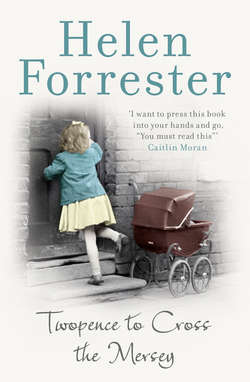Читать книгу Twopence to Cross the Mersey - Helen Forrester - Страница 6
One
ОглавлениеHelen aged 6, 1925
Liverpool is a city through which visitors pass on their way to other places. It is to them a dull world of shipping and commerce which sprawls untidily along the north bank of the River Mersey. Many of them will not know that it has a sister port, Birkenhead, on the opposite bank, which is linked to it by ferry-boats, a railway tunnel and a road tunnel. Beyond Birkenhead lie the small seaside towns of the Wirral peninsula and behind them is pleasant countryside. My widowed grandmother lived in the Wirral, and here, while visiting her, I spent the happiest days of my childhood, on sandy beaches or in wind-swept gardens. I remember with love the rain-soaked hills looking out on to stormy seas and the turbulent estuary of the Mersey.
It used to cost twopence to cross the river on the ferry-boat from Liverpool to Birkenhead. Twopence is not a very large sum, but if one has no money, the river is a real barrier, and, during the Depression years, was an impassable one to many of the poverty-stricken people of Liverpool.
Not so many years ago, I took my little Canadian-born son to see Liverpool and the places of my childhood.
‘Did you live here when you were small, Ma?’ he asked incredulously, his strong North American accent sounding strange amid the thick, nasal speech around him.
‘Yes, I was in Liverpool for part of my life.’
‘My, it’s dirty! Do you mind it being dirty?’
I smiled, seeing it all through his stranger’s eyes, eyes accustomed to new buildings, miles of neon signs, miles of prairie golden with wheat or diamond-white with snow.
I laughed down at him a little ruefully.
‘Yes, at first I did mind. Not now, though. I soon learned that people and cities which do the hard, unpleasant work of the world can’t help getting dirty. Liverpool’s a wonderful place when you get to know it.’
He looked at me derisively and said, with all the cold logic of a five-year-old, ‘They should use more soap and – wash the streets.’
My smile faded, as cold shadows of winters past crept over me. That was how I had felt, when first I had really looked at the city and not passed through it as a traveller. God, how I had minded the dirt! How terrified I had been! How menacingly grotesque the people had looked; children of the industrial revolution, nurtured for generations on poor food in smoke-laden air, grim and twisted, foul-mouthed and coarse, shaped in this strange gloomy world to serve the trade to the Americas. And I, a middle-class girl of the gentler south-west of England who had been shielded from the rougher side of life by a private school system and obedient servants, had nearly gone mad with panic when, with little warning, I had been thrown amongst them. Gone was the protection of money and privilege; I had to make what I could of this grimy city and its bitterly humorous inhabitants and share with them their suffering during the Depression years.
I clutched my son’s confiding little hand in mine, as, for a second, I felt again the fear which had enveloped me that January day in 1931, when, at the age of twelve, I arrived in Liverpool, not to pass through it as I had done before, but to live in it.
It seemed to me that it was not my son’s hand which I held so tightly but the hand of my youngest sister, Avril, and that I could hear her snivelling, as we looked out from the entrance of Lime Street Station and saw, through icy, driving rain, a city which seemed to be slowly dying, unloved and unsung, in the Depression of the nineteen-thirties.
